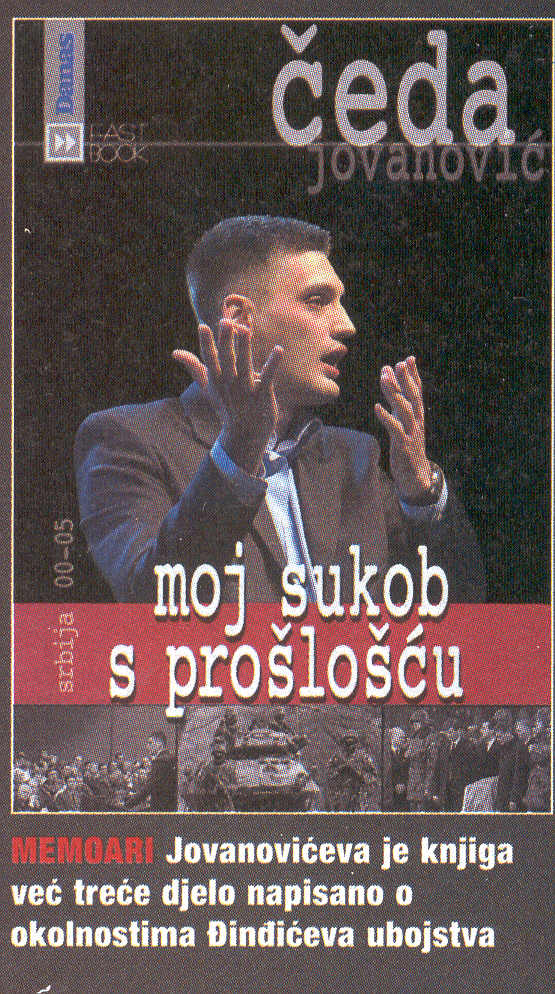In thrall to the past
by Ceda Jovanovic talks to Darko Hudelist
 The former Serbian deputy prime minister Čeda Jovanović has just published Moj sukob s prošlošću [My Conflict with the Past], in which he describes the struggle for power that resulted in the assassination of Zoran Đinđić on 12 March 2003. Jovanović, born in 1971, was a leader of the anti-Milošević student movement in 1996-7. He joined Đinđić’s Democratic Party (DS) in 1998, became its vice-president in 2001, and leader of the parliamentary club of DOS deputies. Following Dinđić’s death he became deputy prime minister in the new government formed by Zoran Živković. He is now in the opposition both to Koštunica’s minority government as well as to the DS headed by Boris Tadić. Dissatisfied with Tadić’s policy of moderation, he set up first the Centre for Contemporary Policy and then the Liberal-Democratic fraction within the DS, which plans to become wholly independent in the autumn of this year. His political credo can best be described as the most radical rejection of Slobodan Milošević’s legacy. His most prominent opponent is Vojislav Koštunica, who in Jovanović’s view is nothing but Milošević’s alter ego. His uncompromising stance has led to attacks on him by Serbia’s leading tabloid press as well as to death threats. He has survived several assassination attempts. The former Serbian deputy prime minister Čeda Jovanović has just published Moj sukob s prošlošću [My Conflict with the Past], in which he describes the struggle for power that resulted in the assassination of Zoran Đinđić on 12 March 2003. Jovanović, born in 1971, was a leader of the anti-Milošević student movement in 1996-7. He joined Đinđić’s Democratic Party (DS) in 1998, became its vice-president in 2001, and leader of the parliamentary club of DOS deputies. Following Dinđić’s death he became deputy prime minister in the new government formed by Zoran Živković. He is now in the opposition both to Koštunica’s minority government as well as to the DS headed by Boris Tadić. Dissatisfied with Tadić’s policy of moderation, he set up first the Centre for Contemporary Policy and then the Liberal-Democratic fraction within the DS, which plans to become wholly independent in the autumn of this year. His political credo can best be described as the most radical rejection of Slobodan Milošević’s legacy. His most prominent opponent is Vojislav Koštunica, who in Jovanović’s view is nothing but Milošević’s alter ego. His uncompromising stance has led to attacks on him by Serbia’s leading tabloid press as well as to death threats. He has survived several assassination attempts.
 Jovanović’s book begins rather strangely, with a prologue titled ‘The Brotherhood of Blood’, whose message is that Đinđić was killed because he refused to join ‘the brotherhood of blood’. He writes: ‘I don’t know why I agreed to talk to a man who, given what he has done to our country, does not deserve to have his name even mentioned. But it does not matter. All paled before what this crude old man told me in his hoarse, sincere voice, in the vice-premier’s office that I was just leaving. ‘Stop disagreeing. Don’t you see the ice is breaking under you? You have a lovely wife and are about to become a father. Find your path on the other side. On this side you have lost forever. Your lives contain only one recorded day: 5 October. You failed to win because you did not wish to bloody your hands. This is why Zoran Đinđić was a loser, and you with him. If you had killed 50, 100, 500 or 5,000 people and forced Koštunica to kill with you, you would not be on your knees today, nor Đinđić six feet under the ground. The brotherhood of blood was the only thing that could have protected you, because crime forms unbreakable bonds. Coalitions are made and unmade, but not those that are based on death. They are eternal. The 12th of March is eternal. You should seek a sanctuary.’ Jovanović’s book begins rather strangely, with a prologue titled ‘The Brotherhood of Blood’, whose message is that Đinđić was killed because he refused to join ‘the brotherhood of blood’. He writes: ‘I don’t know why I agreed to talk to a man who, given what he has done to our country, does not deserve to have his name even mentioned. But it does not matter. All paled before what this crude old man told me in his hoarse, sincere voice, in the vice-premier’s office that I was just leaving. ‘Stop disagreeing. Don’t you see the ice is breaking under you? You have a lovely wife and are about to become a father. Find your path on the other side. On this side you have lost forever. Your lives contain only one recorded day: 5 October. You failed to win because you did not wish to bloody your hands. This is why Zoran Đinđić was a loser, and you with him. If you had killed 50, 100, 500 or 5,000 people and forced Koštunica to kill with you, you would not be on your knees today, nor Đinđić six feet under the ground. The brotherhood of blood was the only thing that could have protected you, because crime forms unbreakable bonds. Coalitions are made and unmade, but not those that are based on death. They are eternal. The 12th of March is eternal. You should seek a sanctuary.’
This man, I was led to conclude, was Dobrica Ćosić. Jovanović told me he holds him greatly responsible for what has happened to Serbia. ‘Our intelligentsia is in thrall to the 19th century. Unable to perceive the future, it has been orienting society towards the past. The national intelligentsia builds its positions on our nation’s deficiencies.’
Darko Hudelist
Hudelist: In your book you state repeatedly that Đinđić was killed five days before the formation of the council of ministers of the Union of Serbia and Montenegro, i.e. on the eve of its ‘assumption of control over the army and its security services, which were behaving as if Milošević was still in power and Mladić sitting in a tank above some Bosnian town’. Do you mean to say that the murder happened in order to prevent this?
Jovanović: Yes. Were it not for the conflict with Koštunica, which lasted practically from the moment of Milošević’s arrest [1 April 2001], Đinđić would be alive today. The murder took place on Wednesday, 12 March. There was a plan to arrest the Zemun gang, including Milorad Ulemek Luković ‘Legija’ and the commanders of the JSO [special army unit]. The witness-turned-collaborator Ljubiša Buha Čume made a statement at the NATO base in Slovakia on Monday, 10 March. On that basis one of the special prosecutors went to Belgrade and signed the arrest orders. The arrests were planned for 13 March. Never before was our society so close to its essential transformation, the kind of transformation which it has been seeking and failing to achieve during the last two hundred years of its history, than in March 2003. Zoran Đinđić’s policy was about to succeed. This is why they killed him.
If the council of ministers had been formed on 17 March 2003, Zoran Živković would have become minister of defence and the actual Serbian government would have taken control of the army.
Correct. It was a decisive moment. The army, together with its intelligence services, was and remains our church. The army was and remains the bastion of the most conservative forces in our society.
What would Živković have done?
He would have dismissed the chiefs of the general staff and of military intelligence, i.e. Branko Krga and Aca Tomić. This was widely known. Koštunica had appointed Tomić head of military intelligence even though he did not have the necessary qualifications. He appointed him because on 28 June 2001 the military intelligence service, which at that time was headed by General Đaković, did not prevent Slobodan Milošević’s extradition, although it was instructed to do that by Koštunica’s express order.
You are very critical of Koštunica, Serbia’s current prime minister.
Our society sees Koštunica as Milošević’s alter ego. He stands for continuity with Milošević’s epoch. Thus, for example, he is more concerned with the destruction of Š ilerova [the headquarters of the Zemun mafia] than with that of Vukovar, Dubrovnik, Sarajevo, Prizren, Peć and Priština; with the death of Đinđić’s murderers Dušan Spasojević and Mileta Luković ‘Kum’ rather than with the tragedy of the eight thousand murdered people of Srebrenica or the two hundred of your countrymen killed at Ovčara, the thousands who lost their nearest or perished in this crazy war - a war which he refuses to condemn. The fact is that Belgrade and Serbia have become the places of refuge for all the war criminals from the area of the former Yugoslavia. They are here among us, celebrated as heroes, whereas anywhere else they would be handcuffed.
But Koštunica is cooperating with The Hague; and every now and then he delivers a Serb general.
True, this society, following Koštunica’s policy, is cooperating with The Hague. But how? It is the cannon fodder that is being moved from Serbia to The Hague. Everything is done in order to avoid the issue of political responsibility for the crime. Serbian society is determined to avoid coming to terms with the past. It simply does not want to know. The whole of the police turned against us [ Đinđić’s government] as soon as we started to investigate the mass [Albanian] graves in the suburbs of Belgrade. Those people did not understand when I told them that we cannot become a normal European capital city while allowing thousands of Albanians to be killed a few kilometres from the place where we live and work. The whole army was against us because we were searching for Karadžić and Mladić, and because we delivered Ojdanić and Milošević. The Hague, in fact, is a red herring! Legija does not care for The Hague or the recent war.
Legija has recently been sentenced to 15 years in prison for the attempted assassination of Vuk Drašković. What do you think will be the verdict regarding his involvement in Đinđić’s murder?
I don’t doubt that the court will pronounce the maximum sentence. But I don’t doubt either that Legija will show no contrition. On the contrary, he will walk out of prison in the same manner in which he arrived in May 2004 - accompanied by half of Koštunica’s government, after reaching an agreement with Koštunica and his people.
In other words, as if nothing had happened?
Correct. He has helped Koštunica to fight us, to fight the policy favoured by Zoran Đinđić. The Earth is round, but they insist it is flat, so sooner or later they will take the step that carries them over into the void.
This is a shortened version of an interview translated from Globus (Zagreb), 8 July 2005. Darko Hudelist is the author of Tuđman - Biografija, Zagreb 2004.
|